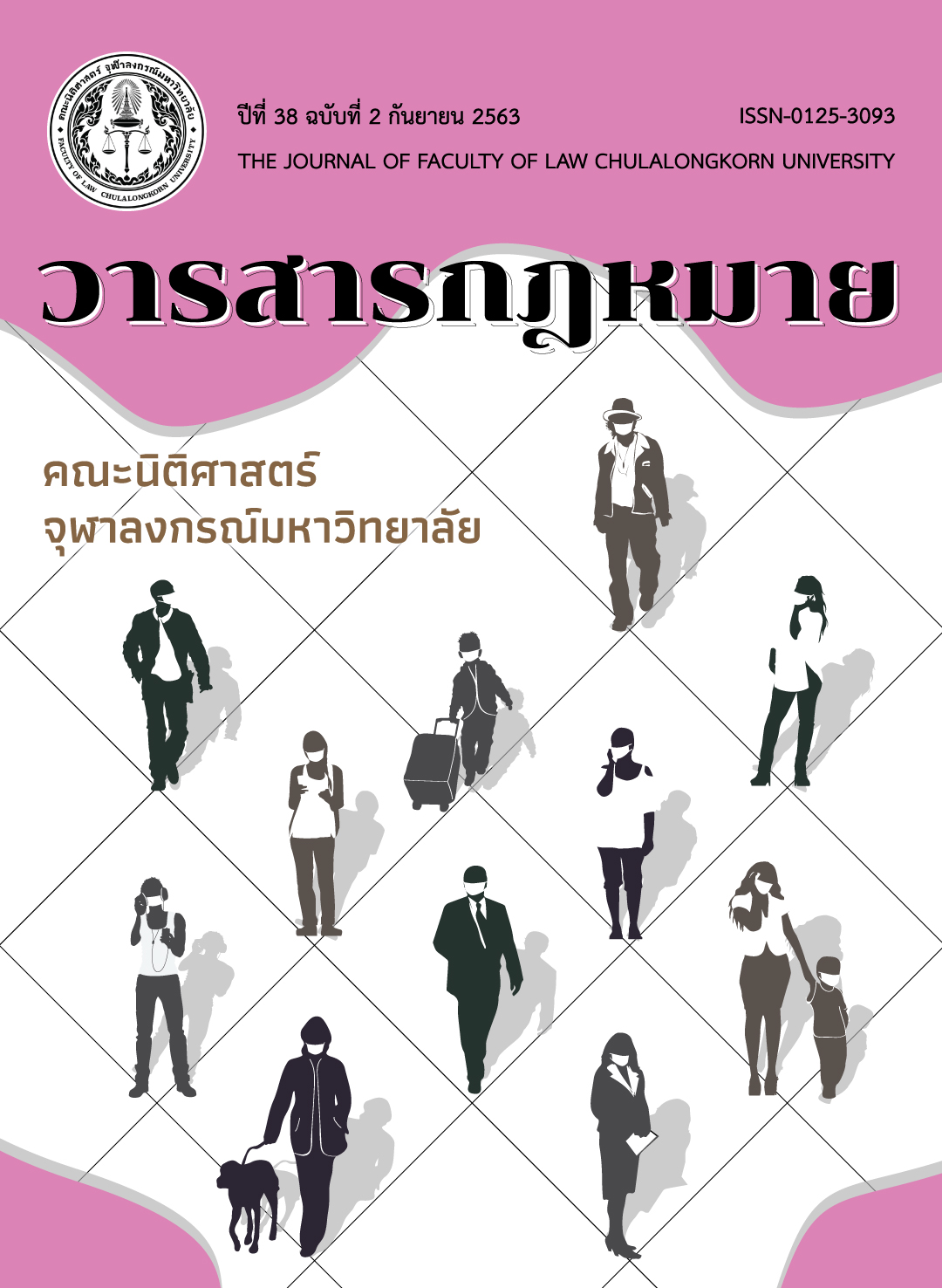ความรับผิดของศูนย์บริการโลหิตแห่งชาติ สภากาชาดไทย และโรงพยาบาล ตามพระราชบัญญัติความรับผิดต่อความเสียหายที่เกิดขึ้นจากสินค้าไม่ปลอดภัย พ.ศ. 2551 ในกรณีที่ผู้ป่วยติดเชื้อจากการถ่า:ยเลือด: กรณีศึกษาจากประเทศสหรัฐอเมริกา และประเทศสหราชอาณาจักร
Main Article Content
บทคัดย่อ
ในประเทศไทย เชื่อว่าทุกปีจะมีผู้ป่วยที่ติดเชื้อเอชไอวีหรือเอดส์ และเกิดอาการอันไม่พึงประสงค์ (adverse reactions) ขึ้นภายหลังจากที่ได้รับการถ่ายเลือด เป็นได้ว่าศาลไทยจะตีความคำว่า “สินค้า” ให้หมายความรวมถึง เลือดและอนุพันธ์ของเลือด ซึ่งจัดจำหน่ายในราคาที่ไม่แสวงหากำไร โดยศูนย์บริการโลหิตแห่งชาติ สภากาชาดไทย ให้แก่โรงพยาบาลรัฐและเอกชน ดังนั้น สภากาชาดไทย ซึ่งมีฐานะเป็นนิติบุคคลภายใต้กฎหมายแห่งราชอาณาจักรไทย อาจจำต้องมีความรับผิดโดยเคร่งครัดในฐานะผู้ประกอบการ ดังเช่นกรณีตามคำพิพากษาของศาลสหราชอาณาจักรในคดี A and others v National Blood Authority and another อย่างไรก็ดี คำพิพากษาในลักษณะดังกล่าวอาจส่งผลเป็นการทำลายระบบการจัดบริการเลือดและอนุพันธ์ของเลือดโดยศูนย์บริการโลหิตแห่งชาติ สภากาชาดไทย แต่เพียงผู้เดียว ซึ่งเป็นระบบที่ดีอยู่แล้วในปัจจุบัน ผู้เขียนจึงเสนอแนะว่า การดำเนินการเกี่ยวกับการสาธารณสุขของประเทศไทยควรได้รับการยกเว้นดังเช่นในประเทศสหรัฐอเมริกา กล่าวคือ มิให้นำพระราชบัญญัติความรับผิดต่อความเสียหายที่เกิดขึ้นจากสินค้าไม่ปลอดภัย พ.ศ. 2551 มาบังคับใช้กับเลือดและอนุพันธ์ของเลือดที่จัดบริการโดยศูนย์บริการโลหิตแห่งชาติ
Article Details
ลิขสิทธิ์และเนื้อหาในเว็บไซต์ของวารสารกฎหมาย (รวมถึง โดยไม่จำกัดเฉพาะ เนื้อหา รหัสคอมพิวเตอร์ งานศิลป์ ภาพถ่าย รูปภาพ ดนตรีกรรม โสตทัศนวัสดุ) เป็นกรรมสิทธิ์ของวารสารกฎหมาย และผู้ได้รับการโอนสิทธิทุกราย
1. วารสารกฎหมาย ให้อนุญาตให้คุณใช้สิทธิอันไม่เฉพาะเจาะจงที่สามารถถูกถอนเมื่อใดก็ได้ โดยไม่มีค่าใช้จ่าย ในการ
- เยี่ยมชมเว็บไซต์และเอกสารในเว็บไซต์นี้ จากคอมพิวเตอร์หรือเครื่องมือสื่อสารผ่านเว็บบราวเซอร์
- คัดลอกและจัดเก็บเว็บไซต์และเอกสารในเว็บไซต์นี้บนลงคอมพิวเตอร์ของคุณผ่านระบบความจำ cache
- สั่งพิมพ์เอกสารจากเว็บไซต์นี้สำหรับการใช้ส่วนตัวของคุณ
- ผลงานที่ได้รับการตีพิมพ์โดยวารสารกฎหมาย จุฬาลงกรณ์มหาวิทยาลัย ถูกคุ้มครองภายใต้ Creative Commons Attribution 4.0 International License ซึ่งอนุญาตให้ทุกคนสามารถคัดลอก แจกจ่าย ดัดแปลง ส่งต่อ ผลงานได้ ก็ต่อเมื่อผลงานและแหล่งข้อมูลได้รับการอ้างอิงอย่างเหมาะสม
2. วารสารกฎหมาย จุฬาลงกรณ์มหาวิทยาลัย สงวนสิทธิ์ไม่อนุญาตให้คุณใช้สิทธิอื่นใดที่เกี่ยวข้องกับเว็บไซต์และเอกสารบนเว็บไซต์นี้ เช่น การคัดลอก ดัดแปลง เปลี่ยนแปลง ส่งต่อ ตีพิมพ์ แจกจ่าย เผยแพร่ จัดแสดงในที่สาธารณะ ไม่ว่าจะในรูปแบบใดก็ตาม ซึ่งเว็บไซต์หรือเอกสารบนเว็บไซต์ โดยไม่อ้างอิงถึงแหล่งข้อมูลหรือโดยไม่ได้รับอนุญาตเป็นลายลักษณ์อักษรจากวารสารกฎหมาย จุฬาลงกรณ์มหาวิทยาลัย
3. คุณอาจขออนุญาตที่จะใช้เอกสารอันมีลิขสิทธิ์บนเว็บไซต์นี้โดยการเขียนอีเมลล์มายัง journal@law.chula.ac.th
4. วารสารกฎหมาย จุฬาลงกรณ์มหาวิทยาลัย เข้มงวดกับการคุ้มครองลิขสิทธิ์อย่างมาก หากวารสารกฎหมาย จุฬาลงกรณ์มหาวิทยาลัยพบว่าคุณได้ใช้เอกสารอันมีลิขสิทธิ์บนเว็บไซต์นี้โดยไม่ถูกต้องตามการอนุญาตให้ใช้สิทธิ ดังที่กล่าวไปข้างต้น วารสารกฎหมาย จุฬาลงกรณ์มหาวิทยาลัยอาจดำเนินคดีตามกฎหมายต่อคุณได้ เพื่อเรียกร้องค่าเสียหายที่เป็นตัวเงินและคำขอชั่วคราวให้คุณหยุดการใช้เอกสารดังกล่าว ทั้งนี้ คุณอาจถูกสั่งให้ชดใช้ค่าใช้จ่ายใดๆ ที่เกี่ยวข้องกับการดำเนินการตามกฎหมายนี้
หากคุณพบเห็นการใช้เอกสารอันมีลิขสิทธิ์ของวารสารกฎหมาย จุฬาลงกรณ์มหาวิทยาลัย ที่ขัดหรืออาจขัดต่อการอนุญาตให้ใช้สิทธิดังที่ได้กล่าวไปข้างต้น โดยเชื่อว่าได้ละเมิดลิขสิทธิ์ของคุณหรือของผู้อื่น สามารถร้องเรียนมาได้ที่ journal@law.chula.ac.th


